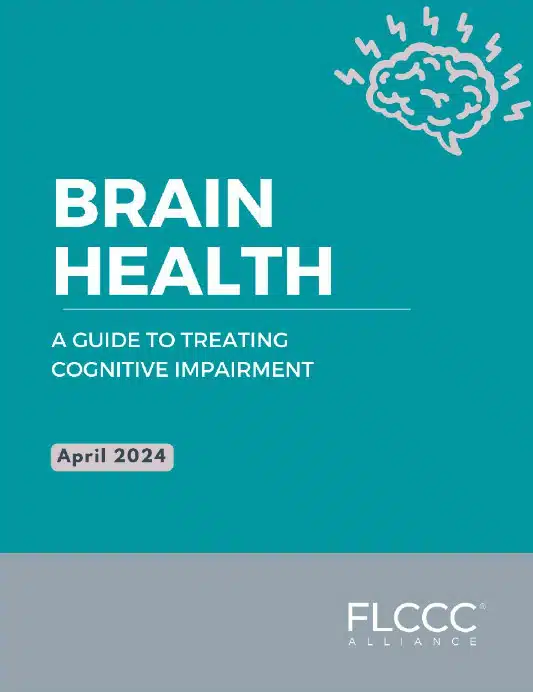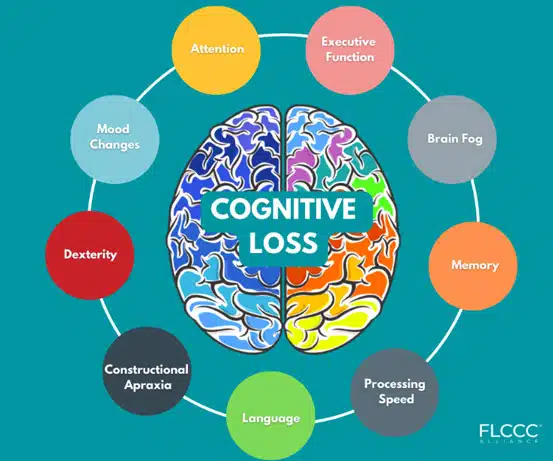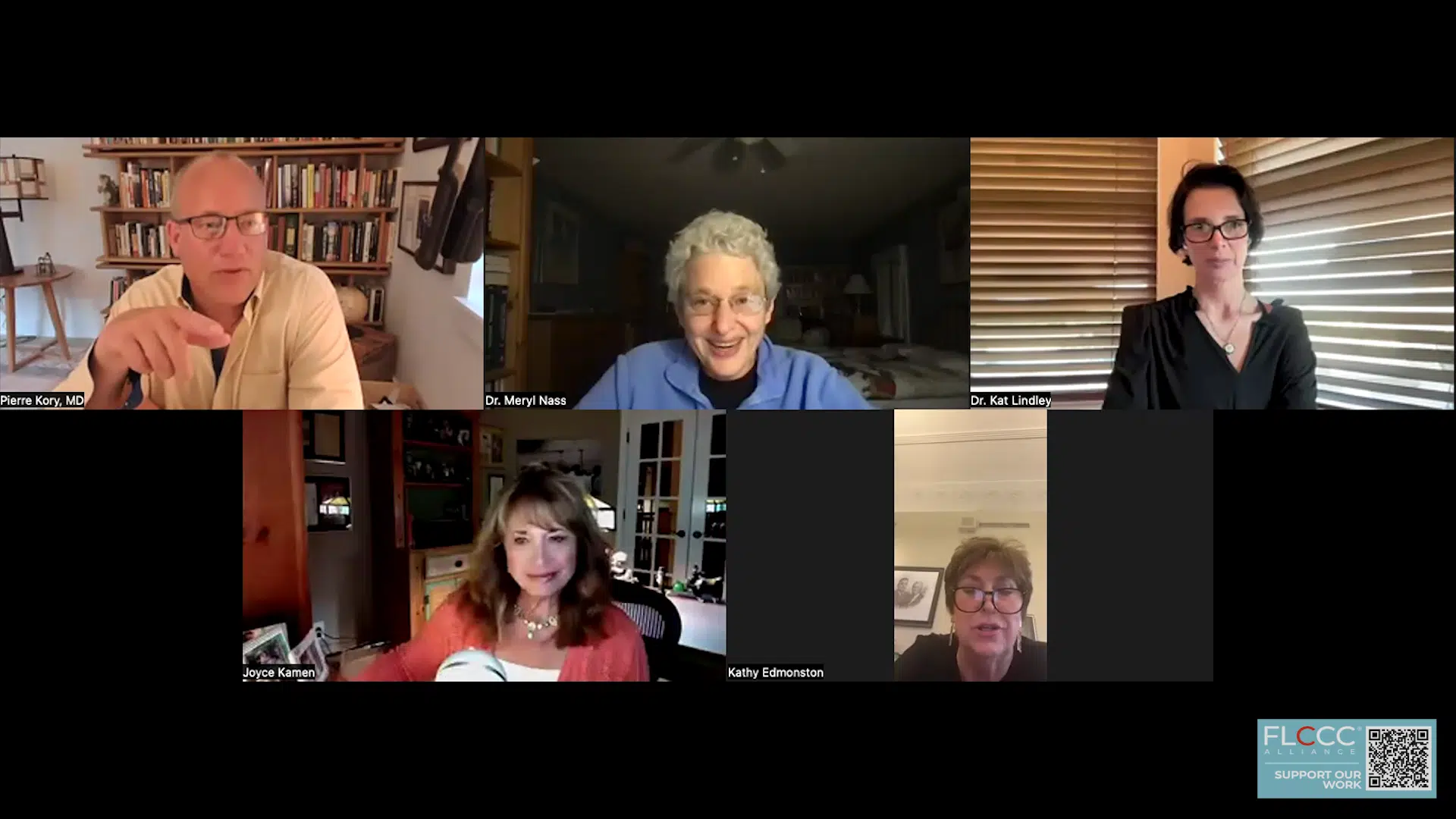Speakers: Dr. Joseph Varon and Dr. Suzanne Gazda
Is COVID causing neurological issues? It’s a question many are asking as we see a rise in cases of brain fog, fatigue, and motor skill degeneration post-infection. Esteemed neurologist Dr. Suzanne Gazda joins the FLCCC weekly webinar to explore the troubling link between COVID and cognitive decline, backed by dozens of studies. Watch as we discuss this critical issue and share vital strategies for brain health, including treatment and lifestyle interventions to protect and improve cognitive function.
COVID and Cognitive Impairment
Can COVID-19 cause cognitive impairment? For the answer, we turn to renowned neurologist and FLCCC clinical advisor Dr. Suzanne Gazda.
“There are now 11 peer-reviewed studies that link having had COVID and developing dementia within 6-12 months.”
Those 11 studies and dozens more are referenced in Dr. Gazda’s freshly published Brain Health Treatment Guide. In collaboration with FLCCC, Dr. Gazda created this guide to address a growing trend of cognitive decline due to SARS-CoV-2 infections.
These days, Dr. Gazda is busier than ever. It’s currently April, but she’s booked through to November.
“It’s not just me, most neurologists are booked out for 4 to 6 months. There’s a tsunami of neurological issues.”
Dr. Gazda points out that these issues actually predate COVID. A recent analysis published in the Lancet showed that neurological disorders have increased worldwide by as much as 50% in the last 30 years.
COVID has taken a bad problem and made it worse. An estimated 30 to 70% of long COVID patients are found to have neurological symptoms. And since the CDC estimates that 1 in 5 people develop long COVID, that means a lot of people are potentially suffering from cognitive deficits.
What Else Besides COVID is Causing Cognitive Impairment?
There seems little doubt that COVID is contributing to the growing number of people with cognitive impairment. One of the main reasons that COVID impacts cognitive function? Lingering spike protein.
As we now know, the spike protein from COVID injections is causing harm throughout the body, and it could be causing brain injury as well. Dr. Gazda says up to 80% of vaccine-injured patients suffer from a neurological injury. In the webinar above, she explains why the spike is so toxic:
“With lingering spike protein there are multiple things going on. Of course, we worry about spike fueling the formation of prions… Amyloid, Tau, Alpha-synuclein… Spike protein easily crosses the blood-brain barrier and causes high levels of neuroinflammation, damage to the mitochondria, vascular dysfunction, decreased cerebral blood flow, and D-oxidative stress.”
Besides the duo of COVID virus and COVID vaccine, Dr. Gazda highlights a laundry list of reasons why cognitive decline is on the rise:
“We live in a very unhealthy world. Over the last few decades, there’s more air pollution, there’s more environmental toxicity, our food in general, the Western diet, heavily sprayed with glyphosate and other chemicals…”
Cognitive decline may also have been caused by a hidden danger associated with lockdowns: loneliness.
“Loneliness is actually a risk factor for not just depression, but cognitive impairment. We certainly saw isolation and loneliness during the pandemic when people were forced to stay in their homes and avoid being around their families. We can certainly never let anything like that happen again.”
What Cognitive Problems or Symptoms Can Develop?
Many patients notice persistent symptoms in the post-acute phase of COVID. For some, the symptoms continue long term and impact executive function in a variety of ways. As Dr. Gazda explains:
“The cognitive impairment is sometimes relatively subtle, you know, executive dysfunction – basically you can’t do your job anymore. Just can’t figure out new tasks. But for some people, it’s subtle memory issues. It can be a difficulty with putting words together. Language can be impaired.”
The Brain Health Protocol provides further insights, citing published studies that identify the following neurological symptoms associated with COVID-19:
- Issues with visuo-spatial function
- Constructional apraxia
- Psychomotor slowing
- Reduced vigilance
- General cognitive impairment
Can Cognitive Impairment be Treated?
The possibility of widespread cognitive impairment is daunting. What options are available for those suffering from cognitive difficulties when immediate access to a neurologist is not possible?
As outlined in the Brain Health Protocol, there are many things you can do right now to improve brain health, including simple lifestyle interventions and supplements. As with any new regimen, consult your doctor or find a provider to help you on the road to recovery.
Learn More: Post-Covid Cognitive Impairment Treatment
Lifestyle Interventions
- Eat well
- Intermittent fasting
- Resistance training
- Photobiomodulation
- Better Sleep
Supplements
- Resveratrol
- Methylene blue
- Melatonin
- Berberine
- Omega-3 Fatty Acids
- Vitamin D3/K2
- B-Vitamins
- Magnesium
What’s Next for Brain Health?
Dr. Gazda stresses it’s not her goal to scare people, but rather to prepare them for the wave of neurological illness she sees coming:
“You know how we talk about turbo cancers? We’re seeing turbo dementia. It’s scary when people in their 40s come in with complaints of brain fog and cognitive impairment and it’s not getting better… and we have to all wonder why.”
In their latest talk, Dr. Gazda and Dr. Joseph Varon say they need an “army of practitioners around the world that can address this problem.” As Dr. Varon says, the first thing we need is awareness that cognitive decline is a real issue:
“[As a doctor], you have to be aware that you need to be looking for these things. You need to stop calling everything a psychological issue or a psychiatric issue or, you know, ‘you are depressed’… I mean, that’s the first thing we have to stop. We still have to stop calling patients ‘crazy’. They’re not crazy. They’re having real illnesses.”
Despite all the challenges ahead, we can find comfort in Dr. Gazda’s optimism:
“We have 86 billion neurons and trillions of connections, and the brain has something really unique and that’s neuroplasticity. The brain can heal itself. Even into old age, we can continue to form new neuronal connections. And I don’t like it when I hear people say that their memory’s bad because they’re getting older. We should have healthy, vibrant memories into our 90s into our 100s! That should be our goal. So neuroplasticity is very possible. And we have included that in our protocol.”
Where would we be without the courageous work of doctors like Dr. Gazda and Dr. Varon? If you want to learn more about brain health and mental health, download these resources and join the conversation.







